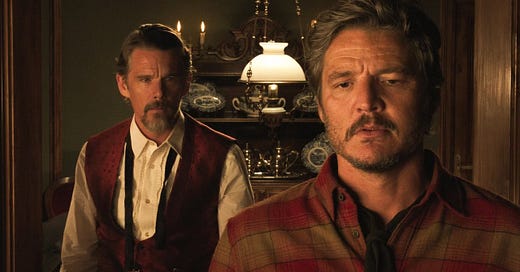“Strange Way of Life” is a Sharp Expansion of Genre
Pedro Almodóvar’s star-studded short responds to the confines of the Western
Pedro Almodóvar’s Strange Way of Life was spurred by what he describes as an interest “in doing things that had not been done in the Western before.” The film, just over thirty minutes, follows a reunion between Silva (Pedro Pascal) and Sheriff Jake (Ethan Hawke), former lovers who spend a night together after twenty-five years apart. Strange Way of Life draws upon the homoerotic subtexts present in the hyper-masculine Western genre and brings them to the surface in a flurry of romance and violence. Despite Almodóvar’s experimental intention, the film may be interpreted as a solidification of a new facet of the Western genre rather than an expansion of it. Almodóvar isn’t the first to try his hand at a queer Western, nor is he the first to do it successfully, as Brokeback Mountain and The Power of the Dog have both achieved momentous acclaim.
But while both those films posit the actuality of queerness lying dormant beneath a Western exterior, sexuality exists as a challenge to their environment that cannot be incorporated into it. Strange Way of Life takes this possibility but imagines a world where a love affair between Silva and Jake is compatible with their way of life. Almodóvar himself considers this short film a carnal answer to the more reserved Brokeback Mountain, a project that he himself was once slated to direct. Almodóvar expressed that Strange Way of Life examines a more animalistic and heated romance than a Hollywood film could offer, and imagines a future for its lovers. While Brokeback Mountain and The Power of the Dog stop at the unconventional possibilities, Strange Way of Life gives an affirmation of a future for its protagonists.
The film is only Almodóvar’s second English-language venture, after his Jean Cocteau adaptation The Human Voice in 2020. Strange Way of Life is less experimental than its predecessor, stylistically treading a well-worn path of the Western genre. However, the homage to the classics is more aesthetic than thematic, as the story establishes a fiery and emotional romance in direct contrast with the masculine stoicism depicted in traditional Westerns.
Because the film is only half an hour, Strange Way of Life is razor-sharp, sometimes even cutting corners with over-expository dialogue. In this way, the movie unfolds like a short story, over-relying on conversation to fill out the narrative. Unfortunately, the sharpness of the film sometimes feels overcrafted, lacking the natural cool intrinsic to the works of Sergio Leone and John Ford. However, Pedro Pascal and Ethan Hawke meet the challenge of blending classic Western tropes with the heated emotions of a suppressed romance, their A-list status enhancing the eroticism of the film and making it all the more subversive.
Ultimately, Strange Way of Life could use a slightly longer run-time so its themes could lay themselves out more naturally, and sometimes it feels as though it is begging to break free of the confines of its short format. But Almodóvar’s loyalty to his characteristic human themes, his expansion of genre, and the simplicity of an enticing story is enough to solidify Strange Way of Life as a work important to the conversation of filmmaking, and a thoroughly enjoyable thirty minutes.
OVERALL RATING: 7/10
Strange Way of Life was released on October 6 and will be streaming on demand soon.





Thanks for sharing this, Ada! Wonderful to read your review; I'm looking forward to seeing this short.
We have that well of tradition to draw on, to help us understand. When we're puzzled we have all the stories that have been handed down from people who had the same problems.